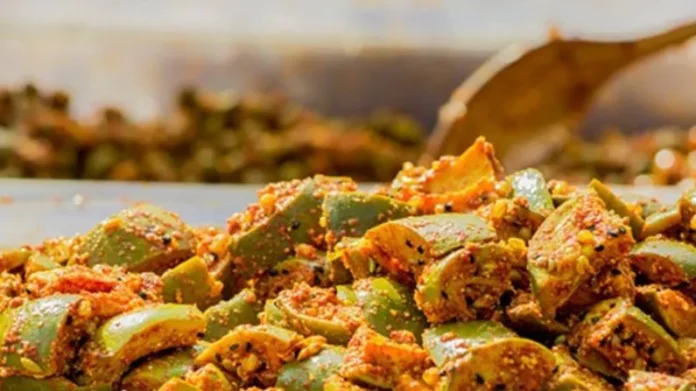Pickles are one of the best additions to food recipes because of their exquisite hot flavour. But are they benefical for the health? Do they have any side effects? Read to know about the pros and cons of having Pickle (Achaar)
Benefits and side effects of Pickle: Pickling is an ancient food preservation process. Although many people connect pickles with pickled cucumbers, it can be produced from almost any cuisine. These are preserved in fermented brine that contains beneficial bacteria, making them a healthy addition to any diet. Without a couple slices of pungent pickles, no excellent burger or sandwich is complete. Pickles are one of the best additions to food recipes because of their exquisite balance of sweet, salty, sour, and hot flavors. But, what kind of nutrition do pickles provide? Are they beneficial for our health? Do they have any side effects? The article provides all the answers to your questions. So here benefits and side effects of pickles that you should know
Benefits of pickles (Achaar) :-
Control Diabetes: Pickles are a healthy diet for diabetics because they are naturally low in calories and carbs. They also help to control blood sugar levels. Pickles and other preserved fruits and vegetables assist to lower HbA1c levels in the blood, which means better blood sugar control.
Helps in Weight Loss: Pickles are nutritious snack that is low in calories and abundant in nutrients. Spicy pickles can aid in fat breakdown. For those who like to keep an eye on the scales, this makes an appealing food for them as it can be consumed with any healthy dish.
Good in Pregnancy: Yes, pickles are consumed by pregnant women, and there is nothing wrong with it. Because achar aids in the relief of morning sickness. Pickles can help with nausea that occurs during pregnancy in the form of morning sickness. Its tangy, tart flavor tingles the taste buds, stimulates hunger, and relieves sickness.
Improves Digestion: Probiotics are produced during digestion, which can help restore the balance of friendly bacteria in your stomach and alleviate digestive problems. Pickles aid in the relief of diarrhea, bloating, gas, and constipation.
Reduces Stress: There is a link between fermented foods and our mental state. Good bacteria found in fermented foods like pickles aid to relax our minds, reducing stress and anxiety. As a result, eating pickles every day keeps worry at bay!
Binge eating any food item can have several negative effects. To gain all of the health benefits, we must exercise portion control. However, consuming large amounts of pickles or the salt solution made from pickles can have serious effects on the body
Side Effects of pickles (Achaar) :-
High Salt: The quantity of salt we get from pickles could be enough to last an average person all day. Pickles, regardless of variety, have a high salt level. They are fat-free and low in calories, however, they may interfere with your daily salt intake.
Increases Blood Pressure: After eating a high-salt meal with pickles and pickle juice, some people may have a transient increase in blood pressure. Excess fluid retention following sodium ingestion might contribute to a rise in blood pressure by increasing the volume of blood plasma in your body. People who have hereditary of high blood pressure, or hypertension must avoid pickle intake.
Water Retention: Water retention is a condition in which the body fails to eliminate excess water. Pickles tend to reduce the body’s ability to retain water. As a result, pickles should only be consumed in small quantities.
Increases the risk of cancer: Pickles are healthy for your health, but only in moderation. Pickles raise the risk of esophageal and stomach cancer, and this is especially true in the case of Asian pickled foods.
High in Cholesterol: Pickles are created by dipping vegetables in oil, which acts as a moisture barrier and preserves them. However, the same oil raises cholesterol levels, putting you at risk of developing or worsening heart disease. In the long run, high cholesterol levels harm the liver.


